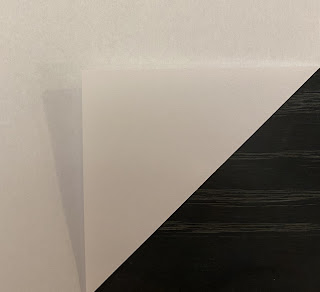The photo above shows a "pick-glass," outlining a square inch of cloth. I took the photo with my iPhone, shooting through the lens of the pick glass, and the image is surprisingly clear.
(OK, I have to confess here that I always thought it was spelled "pic" -- until I looked up "pick-glass" on Google. Yes, it's true. Now I know.)
If you're thinking this is a useful device and you want one, you can find them on Amazon, of course, by searching for "counting glass" or "thread counting glass" or "pick counting glass." I'm sure they're used all the time in the textile industry. For weavers, it's a very handy device.
In the photo above, I have woven what looks like a 24 picks per inch on a warp sett at 24 warp ends per inch -- which would be a balanced weave, except that I'm using different weights of yarn in the warp and the weft. (The orange warp ends are 16/2 bamboo and the pale green weft yarns are silk/stainless steel at an unknown grist, something like 20,000 yards per pound.)
Also, this is double weave, so there are another 24 warp ends and 24 weft picks on the back side of the cloth. You can see some of the warp and weft peering out in lilac and turquoise, respectively. So we're really talking about 48 epi and 48 ppi total. I decided to use my pick glass to reassure myself that I wasn't beating the gossamer-fine weft too hard.
Because weavers are persnickety, right? And rightfully so, as we want our cloth to have a good hand and our weave structures to look just so, whether it's plain weave or satin or twill or whatever. For that reason, weaving patterns will often specify ends per inch and picks per inch along with the type of yarns to be used.
If we're not paying attention, we wind up with this:












4 comments:
Great read! I have a question somewhat related. I have an echo weave that I want to weave and I have some 5/2 tencel for warp. I was thinking 28 epi. Will this work? I took your class at MAFA and it gave me a great jumping off point; but we were working with cotton not tencel. Any thoughts?
Nancy,
You may remember from the workshop the rule of thumb that I use (following the advice of Bonnie Inouye): the sett for Echo should be somewhere between that recommended for twill and that for double weave.
For 5/2 Tencel, the twill sett is 18 epi and the double weave sett is 32 epi, typically. I usually split the difference, so I would recommend 24 epi. You can certainly sett it at 28 epi, which will give you a stronger visual pattern, but keep in mind that the hand will be denser.
Your best bet is to try one sett and then re-sley for the other -- and wash the samples to see which one you like the best.
Denise,
Thank you for describing the discovery of the "pick-glass" and why it matters to weavers. I have been looking for something similar for years, and can also see myself wearing it on a lanyard.
The pattern comparison between heavy vs gentler beating is a fine illustration of your point.
Thanks for the education!
Keep on sharing.
Leslie
Post a Comment